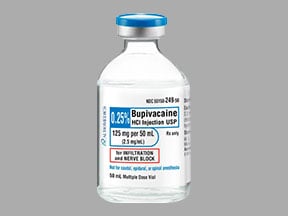
Marcaine Coupons & Savings Card – Discount Prices from $1.01
Brand for: Bupivacaine
My prescription
Edit
10ML of 0.25%, Bupivacaine (1 Vial)
Select pharmacy

CVS
$19.38
COUPON PRICE
Walmart
$1.01
COUPON PRICE
Walgreens
$3.89
COUPON PRICE
Albertsons
$4.39
COUPON PRICEMarcaine savings card
Show this card to your pharmacist
Walmart
$1.01
BIN
ID
PCN
GRP
019876
LH57A19F3F
CHIPPO
LHX
Powered by
More prescriptions for pain
More prescriptions for pain
Marcaine (Bupivacaine) dosage forms
Dosage Quantity Price from Per unit 10ML of 0.25% 1 Vial $1.01 $1.01 10ML of 0.5% 1 Vial $1.01 $1.01 10ML of 0.5% 2 Vials $1.01 $0.51 10ML of 0.5% 3 Vials $2.43 $0.81 10ML of 0.25% 2 Vials $1.01 $0.51 10ML of 0.25% 3 Vials $1.01 $0.34
| Dosage | Quantity | Price from | Per unit |
|---|---|---|---|
| 10ML of 0.25% | 1 Vial | $1.01 | $1.01 |
| 10ML of 0.5% | 1 Vial | $1.01 | $1.01 |
| 10ML of 0.5% | 2 Vials | $1.01 | $0.51 |
| 10ML of 0.5% | 3 Vials | $2.43 | $0.81 |
| 10ML of 0.25% | 2 Vials | $1.01 | $0.51 |
| 10ML of 0.25% | 3 Vials | $1.01 | $0.34 |
Is Marcaine a steroid injection?
Marcaine is not a steroid injection. It is a local anesthetic used to numb a specific area of the body to prevent pain during surgical procedures, labor, or other medical interventions.
Where do you inject Marcaine?
Marcaine is typically injected by a healthcare professional into the area around a nerve or into the epidural space of the spine, depending on the procedure. It is used to provide local or regional anesthesia. The specific injection site will vary based on the type of procedure and the area requiring anesthesia. It is important that Marcaine is administered by a trained healthcare provider to ensure safety and effectiveness.
What is the drug Marcaine used for?
Marcaine is used as a local anesthetic. It is commonly administered to numb a specific area of the body during surgical procedures, dental work, or other medical interventions. It works by blocking nerve signals in the body, providing pain relief during and after procedures.
What is the concern when using Marcaine?
The primary concern when using Marcaine (bupivacaine) is the potential for systemic toxicity, particularly if the drug is inadvertently injected into a blood vessel. This can lead to central nervous system and cardiovascular effects, such as seizures, cardiac arrhythmias, or even cardiac arrest. Additionally, there is a risk of allergic reactions and localized nerve damage. It is important for healthcare providers to monitor patients closely for any adverse reactions during and after administration.
